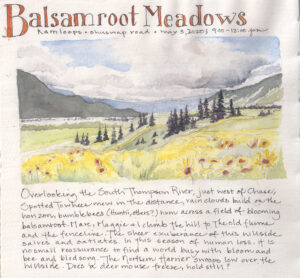Two months and one week ago, like so many, I woke to a new way of living: working without leaving the house. Notes that I made as my normal 8:30 am lecture time came and went–me still at home; the four walls of my normal lecture hall stubbornly empty–reveal a mix of emotions: wonder and worry circling around one like awkward dance partners. Wonder that such an event could come to pass (even though I had read David Quammen’s Spillover and knew the events that were unfolding have long been possible). Worry about those in my community particularly vulnerable to what we understood–back then in what seems a lifetime ago–about the biology of this novel virus. I might have also been a tiny bit relieved. All of a sudden my normal spring list of obligations was thinned, pared down to only that could be completed without venturing too far outside the house. It’s hard now to even remember everything that got cancelled: presentations in local schools, a workshop at a nearby university, helping to organize an undergraduate student research conference, reviewing student presentations for the conference, attending our annual end-of-year faculty-student roast, arranging my botany class ‘local-food’ potluck, coordinating our university’s ‘Bee Happy Garden’ clean-up. I do remember thinking that maybe my secret relief about the occurrence of a global pandemic might be a sign that I needed to reconsider my time-management choices.
 In the weeks since, I have ventured outside the city limits of Kamloops three times: the first two happened early on, when I was still in denial. I didn’t go far–only thirty minutes away to capture images from a middle-elevation lake still caught in the grip of winter. And then weeks later, out with Marc and Maggie, to sit for a few hours in the glory of our spring bloom.
In the weeks since, I have ventured outside the city limits of Kamloops three times: the first two happened early on, when I was still in denial. I didn’t go far–only thirty minutes away to capture images from a middle-elevation lake still caught in the grip of winter. And then weeks later, out with Marc and Maggie, to sit for a few hours in the glory of our spring bloom.
Multiple lessons have reverberated through this strange time. As spring came slowly, but surely, back, it felt odd that our species was so afflicted when others–the chickadees and the juncos and varied thrush (!first time ever in our yard) and the snowdrops and dwarf daffodils–went blithely about their business. But then I realized this is what the last 500 years must have felt like for so many of the more-than-human species of this world. What it must be like to lose your kin, to worry about your elders and your neighbours, while another species profits with little apparent concern for your well-being. My ornithologist colleagues say that this past winter must have been good for bird recruitment. For the last 10 weeks my neighbourhood has swelled with birds and for the first time in 15 years, I have been home to see it. All day, every day.

